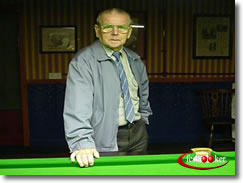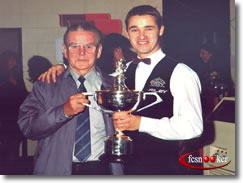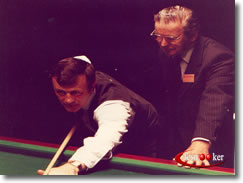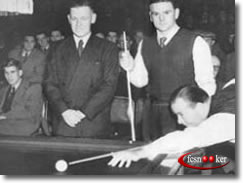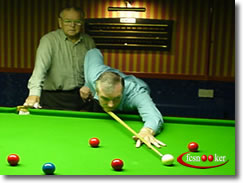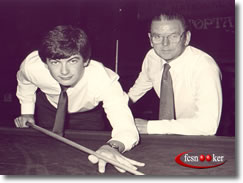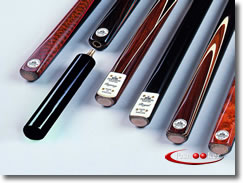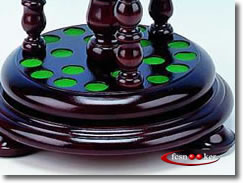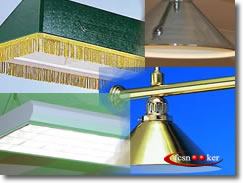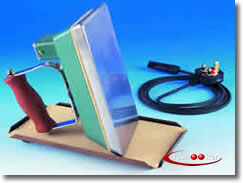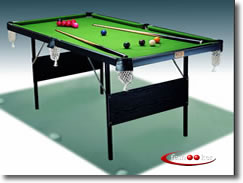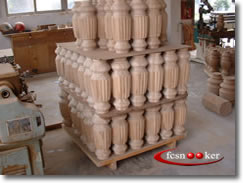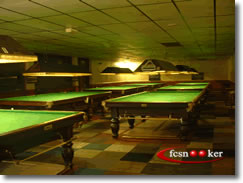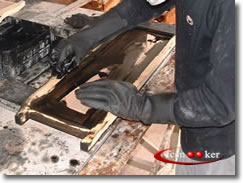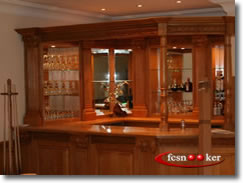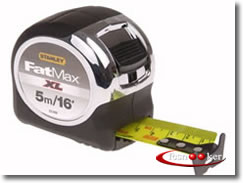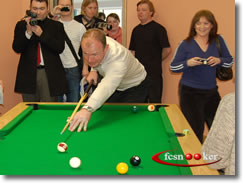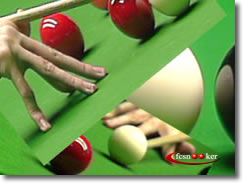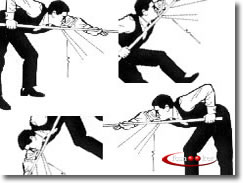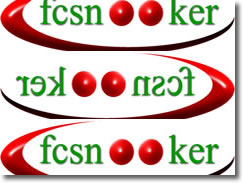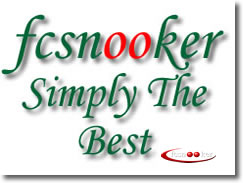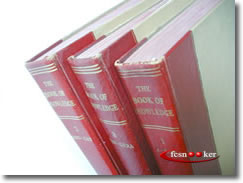 |
|
|
fcsnooker
- Top Quality Snooker Coaching and Instruction in association
with Mr Frank Callan -
Coaching with Callan - |
 |
|
Firstly, after playing for thirty-four years in his own way, he had to learn to play the way I wanted him to in the future. Secondly, he had to learn to be a winner again, by competing against and beating the best players in the world. Doug's
game was in a dreadful state when we got together in February 1988.
He had been playing by sheer instinct - he was that sort of player
- but finally the game caught up with him. In the end he just couldn't understand what was going wrong and this only fuelled the doubts. It became a huge mental problem for him. No longer could he rely on natural ability, no longer was he knocking in the balls almost automatically like he used to. His consistency had gone haywire. Doug has always had bottle and dedication. He always tried to put up a good show, even if his method was lacking at times. But when his own game reached such depths that he even contemplated quitting, a word with his close friend, Terry Griffiths, put in motion the chain of events which sent him heading towards me in Blackpool. Doug had never read a book about snooker, never had a day's coaching in his life, and I knew as soon as he picked up his cue and practised with me that a lot of hard work had to be done if he was to become successful again. For instance, Doug's idea of putting side on the cue ball was to hit across it either to the left or the right. Cueing in a straight line just didn't enter his thoughts.
It is hard enough mastering side in the first place, and Doug's method made it that much more difficult because big allowances had to be made with each shot as the cue ball went even further off line. It certainly didn't help consistency, but it did show how much natural ability he possessed to have got away with a method like that for so long. When
I first discussed Doug's problems with him, I also realized he didn't
know which was his master eye. I knew it was the right eye, yet
he was playing with his left eye over the cue. At first I got Doug
to play shots as he always had over the years. Then I showed him
how I wanted him to play them. He couldn't believe it when the balls
started going the way he wanted. The fact that his left eye had
been over the cue instead of the right eye was the reason why he
wasn't middling the cue ball when he thought he was. Fortunately, Doug was a willing pupil. He was prepared to put in a lot of hard work. After all, everything had to come from him once he knew what to work on. The World Championship that year (1988) was his first opportunity to test out the new methods, which he realized would take time to develop. He won his first match against Barry West, 10- 6, then lost 13-1 to Neal Foulds. The match report in Snooker Scene said: 'Under pressure he was undone by having to concentrate on technique rather than what he was trying to do with it.' Unfortunately, it does take time for new methods to become internalised so that all your concentration is free for the game. Doug never expected to do anything in the World Championship, but it was a start and throughout the summer he visited me three or four times as I set about knocking his game into shape. I could see he was going the right way at the practice table and, to help him progress with a new action, he played in a handful of pro-ams, reaching the final in one of them.
Practice was concentrated on the drill, and this is what the new action was all about. It surprised me really that he had coped so well with it having played along completely different lines for thirty-odd years. To change from something which had come naturally to him was very hard. At
the start of the 1988-9 season, Doug beat Dave Martin 5-1, then
lost 5-4 to Joe Johnson in the fourth round of the Fidelity International
at Stoke. That performance told me only too well he had to overcome
a mental problem. For two years he had been sliding down the ranking
list by losing to all and sundry. Now his game was coming together
again, but it still was not easy for him to think in terms of winning
against a leading player. In sight of the winning post it was hard
for him to accept that he was back with the big boys - and with
every chance of beating them. There was some encouragement, though, in the Rothmans Grand Prix. Stephen Hendry was the defending champion, but he hadn't really prepared himself properly for the new season and wasn't firing on all cylinders. Doug was feeling more confident and playing much better, and he won 5-1. He should really have got to at least the quarter-finals, because he was 4-0 up on Alain Robidoux before losing 5-4. Alain did very well, but he had a crucial fluke in the seventh which would otherwise have given Doug an easy chance for frame and match. Doug acknowledged afterwards, though, that some of it was his own fault: 'I got a bit tentative and uptight. I was trying to protect what had.' What Doug had to do was to believe in himself again and realize he could be a winner. Doug's 5-4 victory over Willie Thorne in the Canadian Masters in Toronto was important, because this was the first close one he had won against a leading player for quite a time. He lost 5-4 to Terry Griffiths in the last sixteen but with any 5-4, it's usually only a shot or two here or there, or even a bit of luck, which makes the difference between winning and losing. It comes down to confidence and attitude in the end.
He had an even worse attack in the quarter- finals. He was five up with six to play on John Virgo, but Doug started to flounder. John started to play well and Doug only just dropped over the line 9-8. He kept telling himself. 'The Drill! The Drill! Hang in there. Don't panic'. But it's not so easy to do. Once he had managed to hold himself together just enough to win, all the tension went out of him. When he beat Terry Griffiths 9-4 in the semi-finals he said he had never felt so relaxed. He'd been confident of his technique for some time. Now he was confident of himself. At
the outset of the event I had still needed to get across to Doug
not to expect too much. I didn't want to put pressure on him in
any way. My last words each time he went to the table were simple.
'Stick to the drill and enjoy yourself. I even added: 'If the drill
is good enough for you to be a winner, fair enough. If it isn't,
well, that's too bad.' But when Doug played Terry in the semi- finals, I told him to give it a whirl. His game was together and it was only human of him to start thinking about the final when he was so close to it. Beating Terry proved to him he was back in the big time and that his new action would stand up to the challenge of winning really big matches. But now came Stephen Hendry, who had just beaten the best player in the world at that time, Steve Davis. Who was Doug Mountjoy to Stephen Hendry after such a victory? Forget about Doug having beaten him 5-1 in the Rothmans. The circumstances were completely different. Stephen respected Doug in a professional way, but did not really believe Doug could beat him over 31 frames. Stephen had played his best snooker against Steve. Could he reproduce it? Certainly he could if he was given enough chances, but how would he play if Doug could put doubt in his mind? I explained to Doug that he should treat Stephen with the same respect as he would Steve Davis. But for Stephen the challenge wasn't quite the same. He had a lot to lose precisely because he was now such a hot favorite to win the title.
As it turned out, Doug's performance surpassed everything I'd hoped for, particularly on the Sunday afternoon when he won all seven frames to lead 14-7, knocking in century breaks in the last two. A third century followed at the start of the last session to put Doug eight up with nine to play. Stephen fought back, but Doug eventually won 16-12. My finger-nails were a little shorter than they had been at tea- time, but even with Stephen winning five frames in a row I could see Doug was still pretty well together - nothing like the man he had been against Virgo. It was generous of Doug to give me so much credit afterwards, but it had been such a pleasure working with a genuine trier that the satisfaction of his success was the big thing for me. As well as he was now playing it was still, more than either of us could reasonably expect that a few weeks later Doug should win the next ranking tournament, the Mercantile Classical at Blackpool, beating Tony Knowles, Paddy Browne, a surprise quarter-finalist, and then Cliff Thorburn, the first time he'd beaten him in seven attempts. Wayne
Jones, who used to be Doug's regular practice partner, did wonders
to get to the final from the other half and led Doug 11-9 at one
stage but Doug's experience and technique carried him through 13-11.
Doug ended the season 10th in the world ranking, up from 24th. His prize money earnings for the season were £181,934, far and away the best of his career.
Doug has been the perfect pupil, even more in harmony with my thoughts than Terry Griffiths. He was prepared to sink or swim with me. He was over the moon at winning the UK. But neither of us ever thought: 'That's it.' There was still more hard work to do. There Always Is! Frank Callan Suite - 282 Ribbleton Lane, Ribbleton, Preston, Lancashire, England - PR1 5EB - tel. + 44 (0) 1772 702211 - info@fcsnooker.co.uk Visit the links below for further information>>>>>>>>>>>>>>>>> |
|
fcsnooker
- The Frank Callan Suite - 282 Ribbleton Lane, Ribbleton, Preston,
Lancashire, England - PR1 5EB - tel.
+ 44 (01772) 702211 - info@fcsnooker.co.uk |
| Snooker
Tables, Snooker Dining Tables, English Pool Tables and American
Pool Tables are very heavy, durable and long-lasting pieces of leisure
equipment. Shown below are many examples of recently installed table
products in clients home addresses. |
|||
|
Quick
Links to the fcsnooker Online Shopping
Catalogue - Buy Products Online |
|||
|
Useful
information to consider before making any Snooker
or Pool table purchase |
|||
|
Snooker
Coaching - Hints and tips, practice routines and a large array of
supporting information |
|||
|
General
information related to fcsnooker, how
to place orders for products, buying terms and conditions, plus
table delivery and installation guidance. |
|||
| To order a newly manufactured snooker or pool table a 10% deposit will be required to book into the fcsnooker order book. Deposit payments are non-refundable should any table order be cancelled. Final remittance payments payable after the table is fully installed and all products and services have been completed. |
|||
| The
Frank
Callan Suite - 282 Ribbleton Lane, Preston, Lancashire, England
- PR1 5EB Company Registration Number: 039 380 85 - VAT Registration Number: 732 5275 41 © 2012 fcsnooker. All rights reserved. |
|||
|
|
|||

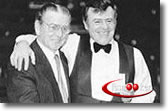 Doug
Mountjoy had
two main problems when he came to me for help.
Doug
Mountjoy had
two main problems when he came to me for help. 
 This
is a very effective way of imparting side on the cue ball but what
happens between the cue ball and the object ball is anybody's guess.
This
is a very effective way of imparting side on the cue ball but what
happens between the cue ball and the object ball is anybody's guess.

 It
takes courage to stick to a new method when you're getting hammered
into the ground, as Doug was by Neal Foulds, or to risk your reputation
at events in which top players don't normally play, but you have
to expose your technique to the strains and stresses of matchplay
because, in the end, this is what matters.
It
takes courage to stick to a new method when you're getting hammered
into the ground, as Doug was by Neal Foulds, or to risk your reputation
at events in which top players don't normally play, but you have
to expose your technique to the strains and stresses of matchplay
because, in the end, this is what matters. 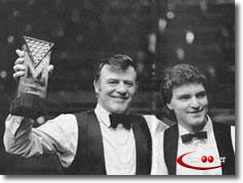 Then
came the Tennents UK, and of course no one could foresee Doug winning
it. The only realistic way to approach it was a match at a time,
but it was a good start to beat Neal Foulds 9-4. Doug said that
it wasn't the same Neal he'd played at Sheffield, but it wasn't
the same Doug either! Doug then beat Joe Johnson 9-5, which was
a good performance except for some nervousness near the end - 'Clincher's
Disease', as Clive Everton calls it. It's really loss of concentration.
The thought of winning and what it means to you destroys your concentration
on the task in hand.
Then
came the Tennents UK, and of course no one could foresee Doug winning
it. The only realistic way to approach it was a match at a time,
but it was a good start to beat Neal Foulds 9-4. Doug said that
it wasn't the same Neal he'd played at Sheffield, but it wasn't
the same Doug either! Doug then beat Joe Johnson 9-5, which was
a good performance except for some nervousness near the end - 'Clincher's
Disease', as Clive Everton calls it. It's really loss of concentration.
The thought of winning and what it means to you destroys your concentration
on the task in hand.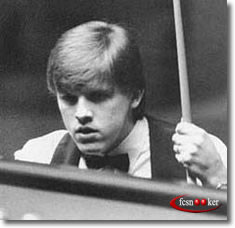
 I
also kept reminding Doug whom he had beaten on the road to the final:
two former world champions, Griffiths and Johnson, and a former
UK champion, Virgo. Deep down I suppose I would have been quite
happy to see him finish runner-up, but I never once ruled out victory.
I
also kept reminding Doug whom he had beaten on the road to the final:
two former world champions, Griffiths and Johnson, and a former
UK champion, Virgo. Deep down I suppose I would have been quite
happy to see him finish runner-up, but I never once ruled out victory.
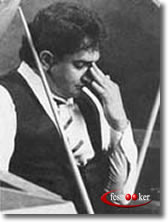
 We
still had things to work on, such as using the rest. He was very
inept with it for a player of his standard. Even during the UK Champion-
ship there were times I dreaded him using it. I also wanted to take
him through various situations he could possibly find at the match
table and practice them time and again. Not only potting but safety,
snookers and escape routes figured in his schedule.
We
still had things to work on, such as using the rest. He was very
inept with it for a player of his standard. Even during the UK Champion-
ship there were times I dreaded him using it. I also wanted to take
him through various situations he could possibly find at the match
table and practice them time and again. Not only potting but safety,
snookers and escape routes figured in his schedule. 